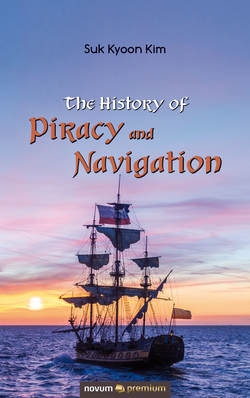Chapter 2 The Roman Empire and Piracy Origin of the Roman Empire Before exploring piracy problems in the Roman Empire, we will briefly take a look at the early history of the empire itself, as well as its sea-going history. The origin of the Roman Empire began with the myth of the legendary twins ‘Romulus’ and ‘Remus.’ The twins, who had been abandoned in the Tiber River when they were babies, were cared for by a she-wolf. One day, a shepherd came across the twin boys who were suckled by the she-wolf, and the man took them home and raised them. As the twins grew up, they became the leaders of shepherds in the region. As their power expanded, they conquered a kingdom that had ruled the region. The twins decided to divide their territory and rule separately, but soon were in dispute. Romulus eventually killed Remus and founded the city of Rome in 753 B.C., making himself a king and naming it Rome in his own honor.Rome, which was only a small tribal state when it was founded, engaged in conquering tribal states around it and ultimately was able to create a unified state on the Italian Peninsula in 270 B.C. Ancient states were eager to take to the sea to build trade networks. By the 8th century B.C., various trade networks centered in the Greek Peninsula, the Peloponnese Peninsula and along the coast of Asia Minor were built in the Aegean and the Mediterranean. They were engaged in fierce competition to take control of the seas, and this eventually led to wars. Meanwhile, Rome gained a foothold to rise as a great empire across the Mediterranean by winning the Punic Wars against the Carthaginian Empire (located on the coast of modern day Tunis). The Carthaginian Empire, which had been a Phoenician colony, dominated the western Mediterranean during the first millennium B.C. As the emerging Roman Republic eagerly sought to take to the Mediterranean, the emerging and hegemonic powers inevitably went to war over control of the Mediterranean. They fought against each other in three wars, called the Punic Wars, over 120 years. During the first Punic War, which ran between 264 and 241 B.C., Romans invaded Sicily, which had been under control of Carthaginians, and annexed the island into its territory. During the second war (218–201 B.C.), Rome faced a true crisis, as the Carthaginian troops led by Hannibal marched into the Italian Peninsula from across the Alps and stayed there for 16 years. Eventually Romans maneuvered a landing on the coast of Carthage across the Mediterranean to cut off supplies and attack the mainland of Carthage. Hannibal withdrew his troops back to Carthage to defend his homeland. At the battle of Zama in 201 B.C., the Roman troops led by Scipio Africanus won a decisive victory. The Roman Republic was able to establish full control over the western Mediterranean, in addition to a massive amount of reparations from Carthage. A half century later, as Carthage challenged Roman rule, a young Scipio organized the Roman troops and besieged Carthage. The Carthaginians surrendered after three years (149–146 B.C.) of resistance, and the Romans totally destroyed the city and slaughtered all living things there. Then they spread salt on the ground so as to prevent any living thing from growing there again. The Carthaginian Empire ultimately disappeared. On the day of the fall of Carthage, a young Scipio went up to a mountain and shed tears while looking down the 700-year-old city, now in flames. Historian Polybius, next to him, asked him why. With a deep sigh, he replied that he had a sense that Rome would someday share that fate. Scipio was applying the iron principle of history – any thriving state is doomed to decline. The Early Roman Empire and
Оглавление
Подняться наверх